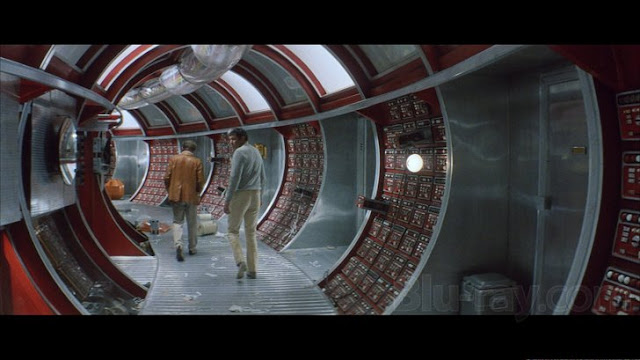Retro Day: Lem vs. Tarkovsky, and a Fantastic Find
 |
| At Solaris station, floating above the ocean of Solaris |
By Péter MARTON
** Join the European Science Fiction group on Facebook for related discussions. **
We've written about Solaris before... And that is Stanisław Lem's Solaris. Now, thanks to a screening of the 1971 Andrei Tarkovsky movie by the Russian Studies Department at ELTE University yesterday, we are here to revisit the subject.
Only, it is not quite the same subject, of course. Much has been said and written about how Lem wasn't really happy about the way his work was adapted to film, and how Tarkovsky on the other hand was in a sense making an anti-SF film, stating that he doesn't like SF -- when the world around us is full of the fantastic, anyway.
 |
| Why would you wish to be on another planet when you can enjoy being in a field like this? Isn't it full of wonder? |
Now, Tarkovsky may have been somewhat ignorant of the diversity of approaches and themes in SF when he stated the above. Even so, his film is ultimately but an interpretation that is within the very wide spectrum of interpretations put forward in the field of Solaristics in Lem's own work. And this interpretation has value in it: while it is indeed amazing to comtemplate whether humanity collectively would just turn its back on another world in the kind of situation depicted in the novel as well as the film, giving up on exploration, admitting defeat, accepting a humble view of the world where there are unbreachable barriers to how much we can possibly know, there most likely are such barriers, regardless of whether we acknowledge them or not.
At the same time, the film largely doesn't hide from the viewer the original plot invented by Lem, it just doesn't convey it the way Lem would have done it. The ending is the obvious exception in this respect: it deviates from Lem's work very significantly. But even this ending can be looked at in several ways. If I take a down-to-specifics SF interpretation of Lem's book, one of the most interesting traits of the ocean of Solaris is its ability to use some kind of quantum-physical 3D-scanning-slash-printing capability. Continuing with that train of thought: if you stick by this, the ending of Tarkovsky's movie just shows this ability working at a distance, possibly. And then it is (would be) quite a scary movie... Akin to what Sean McMullen pulled off in The Audience, a short story possibly (likely?) inspired to some extent by Solaris.
Of course, the philosophical points in the ending of the Tarkovsky movie are not lost on me, and human beings appearing like islands or planets unto themselves is an old theme in literature, definitiely not only SF. But still, the above thought occurred to me watching yesterday's screening, having seen the movie for the second time now, and I thought it may be interesting to share it, perhaps for a debate.
Lesson: a single work of art can be like the ocean of Solaris, easily!
P.S. I visited an antique book shop before the screening and found a beautiful copy of Ludvík Souček's 1964 book The Secret of Blind Birds. Souček is a major author of SF from the time of Czechoslovakia. The copy of his book is quite special: it is an illustrated edition. I won't share images of it here, but you can find proof of life in the FB group belonging to this page.



Comments
Post a Comment